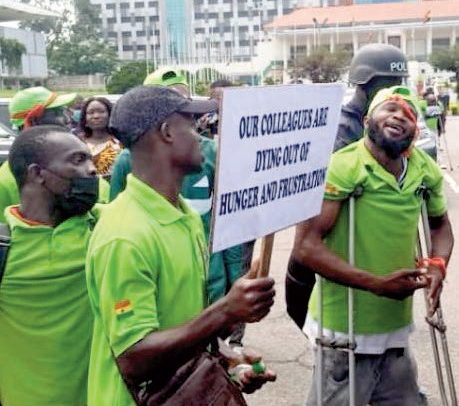A section of the toll workers in Parliament
FORMER WORKERS at the country’s toll booths have called on the government to restore toll operations, asserting that the revenue from tolls are used to finance the building and maintenance of road networks.
The ex-toll workers, who have organised themselves under an umbrella name: Professionals and Allied Workers Union (PAWU), presented a petition to Parliament yesterday, during which they explained their plight after the cessation of the collection of road tolls.
Presenting the petition, Secretary of PAWU, Edward Duncan, said the government still owed them salaries, and this had left them in pain and suffering.
“We were promised that our monthly salaries would continue to be paid until we were re-assigned, but for the past six (6) months our salaries have been in arrears and instead of being reassigned, the appointments of those of us working with the Tolls and Routes Management Ltd have been terminated,” Duncan stated.
According to him, a total of 800 people lost their job after the abolishment of the toll operations, appealing to Parliament as the people’s representative, to prevail on the government to resume the operation of tolls in the country.
Toll facilities in Ghana include toll roads and bridges, and the toll is traditionally due when the patron passes a collection point in the form of a gantry.
On the Tema Motorway, advances in technology partially changed the physical toll gantry concept with virtual toll points.
Mr. Duncan said toll facility users pay for some construction costs of roads in the country, thereby freeing public resources for other uses.
“Our operations do not and have not been dependent on subversion by the state. On the contrary, road toll collection is a major source of regular income for the state through the Ghana Road Fund,” he asserted.
“We also pay taxes. On the average, monthly revenue collected under Tolls and Routes Management Limited, the private company managing 20 major tolls in the country, amounted to GH¢6,200,” he noted.
BY Ernest Kofi Adu, Parliament House


